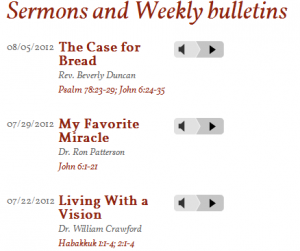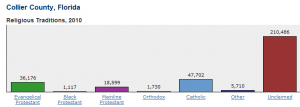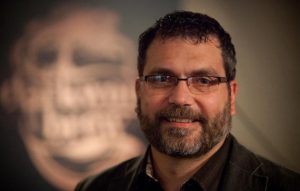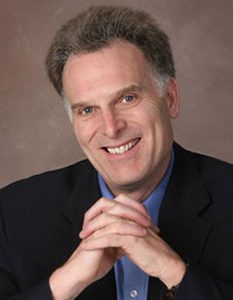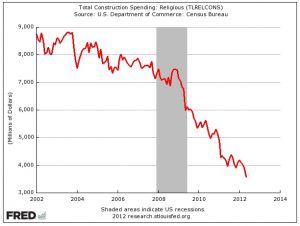In the Sunday paper, I encountered a half-page AP article written by Calvin Woodward and Christopher S. Rugaber that offers incredible insight into our changing nation. Consider these facts: Closer Together: Cities and closely surrounding suburbs are growing faster than farther-off suburbs for the first time in over 20 years Less Mobile: Mobility (defined by the percentage of population that moved in the last year) is at lowest it has been since the Census Bureau started Read More …
Trends
Spong on Seminaries (#0830)
John Shelby Spong served as bishop of the Episcopal Diocese of Newark for 24 years before his retirement in 2001. In retirement, he has been a prolific writer and speaker. After teaching a weeklong intensive course at the Pacific School of Theology, he reflected on how that school has changed to more effectively meet the demands of preparing people for ministry in the early twenty-first century. He is hopeful that this institution's current intentions will Read More …
Religious Engagement via Social Media (#0824)
While America remains a country with high levels of belief in God, most Americans are not talking about religious matters via social media. According to a recent (July 2012) survey of 1,026 American adults: 13% have downloaded a religious podcast of a sermon or listened to a sermon online 11% have posted status updates about being in church 10% have used a cell phone to take pictures or record video during worship 6% belong to one or more religious groups on Facebook 5% Read More …
Unusual Job Perks (#0817)
Before the economic downturn job perks at top companies were significant and, in many cases, expanding. During the most recent lean years many companies have scaled back in all areas, including perks. Google is well known for its creative work spaces and generous perks. Earlier this year they added a new death benefit payable to the surviving partner or spouse of any employee who dies. More specifically, Google will "pay the spouse or partner of a deceased staffer Read More …
Religion in Your County (#0815)
I was pleasantly surprised to learn the Association of Religion Data Archives offers free and easily searchable county-level information on religion (a big thanks to Jerry Park for mentioning it a few days ago). A few seconds after clicking through to the site I was viewing data on my current county of residence. The bar graph appears below, but the actual data produced by the county search includes the 2010 report broken down by religious bodies and the ability to see Read More …
12 Marks of Convergence Christianity (#0814)
Eric Elnes, Senior Minister of Countryside Community Church (UCC) and host of Darkwood Brew, has recently written several blog posts on Convergence Christianity. His latest post features twelve defining characteristics, which are evenly divided into three categories: Love of God, Love of Neighbor, and Love of Self. Elnes attributes resonate with others, including Brian McLaren, Phyllis Tickle, Frank Schaeffer, and Diana Butler Bass. Love of God They are letting go Read More …
Religious Confidence Reaches All Time Low (#0802)
Americans' confidence in religion has been declining for decades. According to the latest Gallup poll, religious confidence has reached an all-time low. So What? Comparing the responses from 1975 to those of 2012 offers a sense of the significance of the shift: % of Americans with “a great deal” or “quite a lot” of confidence in “the church or organized religion" Then: 68% Now: 44% Rank on the list of 16 organizations included in the poll Then: #1 Now: #4 Read More …
Saving Liberal Christianity (#0797)
Earlier this week, my post "Can Christianity Be Saved" considered Ross Douthat’s July 14, 2102, New York Times editorial “Can Liberal Christianity Be Saved?,” and Diana Butler Bass's reply later that same day on the Huffington Post. During the course of the week I returned to the topic in online and in person conversations. The most encouraging part of the dialogue was the shared understanding about three interelated matters: There is a real Read More …
Continuing Decline in Church Construction (#0782)
The following image illustrates the dramatic decline in total religious construction spending in the United States since 2002. So What? The amount spent on construction has trended downward for the last decade. While a slowdown during a recession is expected, this is something far more significant. This year's religious construction expenditures are on pace to be less than 50% of what was spent in 2002. Many church budgets are flat or declining and many have halted all Read More …
A Holy Bible or Kindle? (#0781)
Thanks largely to the work of the Gideons International, travelers normally find a copy of the Bible in their hotel rooms. The Hotel Indigo Newcastle, one of InterContinental Hotel Group's boutique-style Hotel Indigo locations, recently announced a new approach: Kindle. More specifically, "all 148 rooms at the Hotel Indigo will contain a Kindle e-reader pre-loaded with a copy of the Bible . . . Guests are also permitted to download a copy of any other religious Read More …


